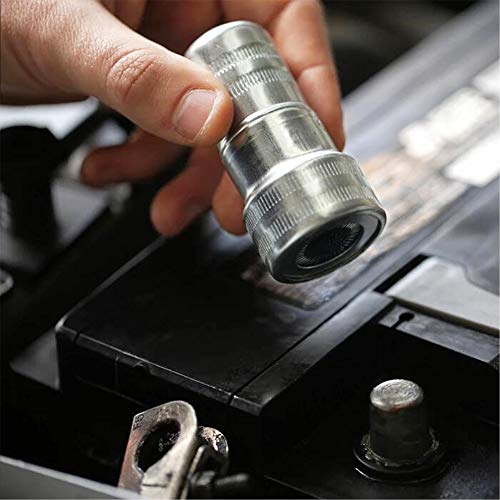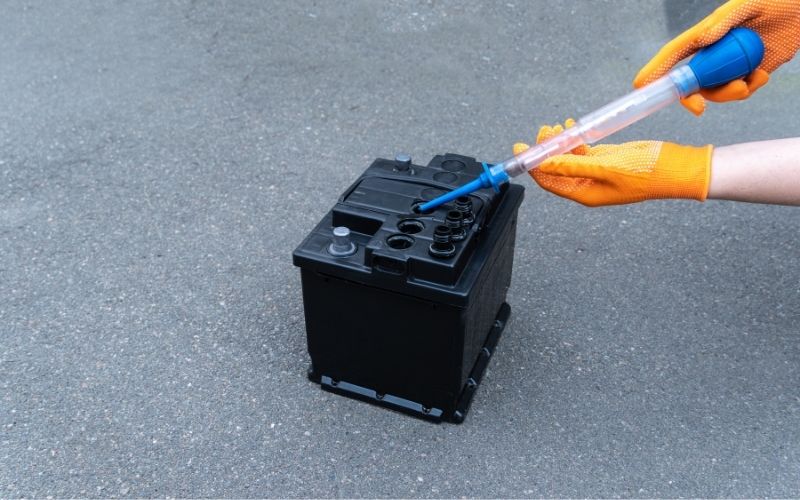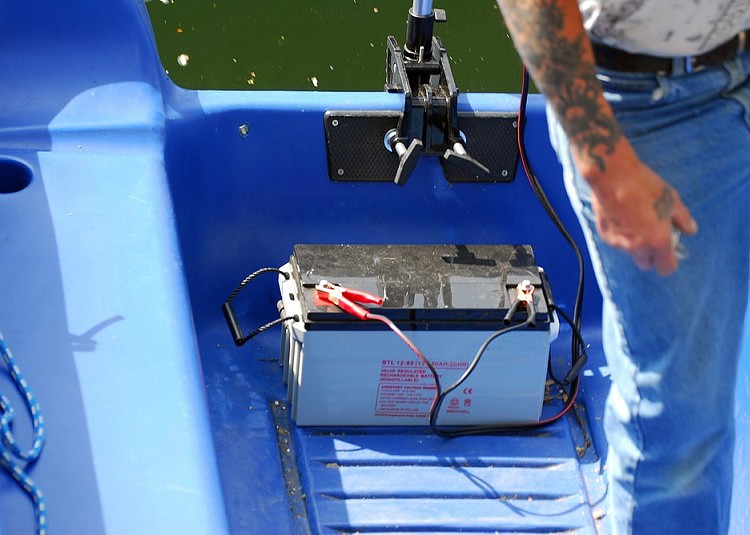Maintaining your marine battery in the winter is the first step to reeling in your favorite fish in the spring. Even though the lake is frozen and the snow is briskly falling, you must prepare to start your engine when the temperature rises.
But how can you maintain the battery during the winter? Is cold weather bad for it? Should you remove the battery from your boat? Is it better to take your battery out of the boat and store it somewhere? How much charge will your battery lose if you simply walk away for the winter and worry about all of this later?
Slide your engine cover on, button up your coat, and let’s find out.
Table of Contents
Can You Leave A Battery In A Boat in the Winter?
Some boaters have left their batteries in their boats in the winter, but it is best to remove the battery if you can.
First, charge your battery fully. A six to eight-hour charge may be needed.
Next, remove the negative battery cable. This will help preserve the battery charge. Be careful that the positive and negative cables do not touch, as this may cause a spark, discharge, or even an explosion.
Put some tape over the cable ends in case the cables should slip and touch. Or, you can tie the cables down. By disconnecting the negative cable, you are not eliminating discharge. Instead, you are merely slowing the discharge rate.
If you choose to leave the battery in your boat for the winter, be sure to keep it covered. Experts say that cold temperature are not what damages a battery. Instead, battery damage is usually the result of heat and vibration.
So, an important consideration is the mooring of your boat. How much movement will the boat have from winter winds and storms?
If your boat is secure and steady, the effects of vibration will be minimal. Since heat is not a factor, these precautions will allow you to keep your battery in the boat in cold weather.
The greatest concern is that the battery may freeze. So research the typical temperature variation in your region.
Follow the weather reports. If you have fully charged your battery, you can expect it to withstand temperatures as low as 75 degrees below zero.

Even with these precautions, the life of a battery can still be shortened. So use a to maintain the charge. Do not keep the trickle charger on consistently. Instead, attach the trickle charger to boost the battery and to keep it at full charge.
Keeping the battery at full charge will increase the life of the battery. A typical marine battery will last three to four years. Batteries that are kept fully charged have lasted as much as six years.
In some respects, cold weather is good for batteries. You will find that cold batteries stay charged longer than warm batteries. A concern is that cold batteries have a greater chance of cracking. That is why it is best to remove the battery if possible.
How To Maintain A Battery in the Winter?
So what is the best way to maintain your battery in cold weather?
First, if you use the battery, be sure to charge it every time you use it. Even if you have only used it for a short time, you will want to top off the charge each time.
Different regions have different weather conditions. You may find that the cold weather is not continuous. Maybe it will warm up enough to allow you to use your boat periodically.
If this happens, you will be tempted to take advantage of the warm periods and use your boat until the freeze returns.
Using your battery for a significant period will help to recharge it, or at least to diminish the discharge. If you do use it, recharge it. Take every opportunity to break up storage time.
But avoid overcharging. Overcharging batteries will shorten their lifespan. You will want to use a charger that offers charging levels. This will help you keep the charge full, without exceeding the maximum charge level.
Consider the Minn Kota brand. Minn Kota offers charging in stages. Minn Kota chargers are strong, water-resistant, and are built to minimize corrosion.
Consider choosing the Minn Kota Precision MK440PC charger . Its charge is precise, and it charges quickly. This will help extend the battery life.
Also, be sure to monitor the water level. Use distilled water and keep the level full. Distilled water is best because it does not contain minerals that are found in tap water. These tap water minerals shorten battery life.
Finally, keep your battery terminals clean. mixed with water is an effective cleansing solution.

PIG Battery Cleaner and Acid Neutralizer is another useful cleanser. PIG also offers wipes and a complete battery maintenance kit. This kit includes wipes, gloves, and other tools which minimize the possibility of acid burns and shock.
Whether you use basic maintenance cleansers or a complete maintenance kit, keeping your battery properly maintained is especially important during the winter. Reducing discharge improves battery life.
A properly maintained battery results in more fun, and fewer worries, when winter is over.
Consider The Type of Battery You Have
While marine batteries are all affected by cold weather, the degree is determined by the type of marine battery that you have.
The temperature at which the electrolytes freeze determines how resistant it is. Marine battery electrolytes typically freeze at minus 80 degrees Fahrenheit. A discharged battery usually freezes at 20 degrees Fahrenheit.
A popular marine battery is a wet cell. Many boaters use wet cell batteries because they store a high amount of electricity. But these must remain upright. Otherwise, dangerous liquid can spill out.
Cooler batteries discharge more quickly than warmer batteries. So keep your battery as warm as possible in the winter.
Gel batteries do not have to be kept upright. If you choose a gel battery, take extra care to prevent it from freezing. They are difficult to revive if they reach this point.
An AGM, or absorbent glass mat battery is a popular choice for boaters who live in cold regions. AGM batteries hold their electrolytes in glass mat separators.
These separators don’t expand in cold weather the way other batteries do. This lack of expansion makes AGM batteries more cold-weather resistant, although they still can freeze.
A battery that is used in colder temperatures produces less current than a battery used at higher temperatures. So expect your battery to discharge more quickly if you use it during the winter.
Also, the stress level on a battery is directly related to the temperature at which it is used. So using a battery in the winter means it will work harder to start your engine or to power your onboard components.
All batteries contain chemical reactions. These chemical reactions happen slower in cold weather than they do in warm weather. This helps to explain the greater discharge rate in the winter.
So cold weather definitely affects marine batteries. But these effects do not have to be bad if you take the proper precautions.
Storing Your Battery
If you are located in a climate that is typically frozen all winter, your best option is to remove the battery from the boat and store it until spring, unless you plan to transport your boat to a warmer climate.
Before storing your battery, be sure to charge it one last time. One last charge will keep the battery at the highest power level when you reinstall it. This also helps to stop the battery from freezing during storage.
Once your final charge is complete, disconnect the negative cable. Test the voltage with a voltmeter . A voltmeter reading of 12.6 volts is ideal.
You should also use a hydrometer to check the gravity of the battery. This will let you know if each battery cell is good.

Gravity is a measurement of how well each cell is charged. If the hydrometer reading is 1.265, you should have a battery that is completely charged.
Next, disconnect the positive terminal. With both terminals off, you are avoiding the slow draining that batteries naturally have. Preventing slow draining is very important.
Carefully remove the battery and hold it upright, without shaking it, as you bring it to your storage place. If you have a garage, store it there. Keep it isolated. Otherwise, store the battery in a storage facility. A facility with a wooden floor is preferred.
You may store a marine battery in your backyard shed for the winter. The temperature inside of your shed should be similar to the temperature your battery would experience if it were inside of your boat.
Choose a storage place that is easy to access. This will allow you to check the battery often.
For safety reasons, remain with your battery while trickle charging. Boaters who store their batteries in boatyards have found that unattended trickle charging is not even allowed.
Of course, you may choose to store your entire boat in a storage facility. If your boat is less than 14 feet by 24 feet, storage facilities like Easy Space Storage are tailored for your needs. The storage units allow enough space for your boat and also provide enough room to do your monthly trickle charging.
Conclusion
So, maintaining your marine battery in the winter is the key to being ready to use your boat in the spring. You can leave your battery in your boat, but this is not your best option.
It is best to remove your battery and seek a storage place that replicates the temperature at the dock. Cold weather is not necessarily bad for a marine battery. The challenge is to diminish discharge and, most importantly, to keep the battery from freezing.
During winter battery maintenance, strive to trickle charge once a month. Avoid leaving your battery unattended during maintenance.
Soon, the snow will be stopping and the ice will be melting. With a properly maintained battery, your motor will be humming as you leave the dock.

I created this site to help people – to help you – with your boat problems. Instead of helping one person at a time, I want this website to be the “one-stop-shop” for everyone’s boating concerns. Read more.

